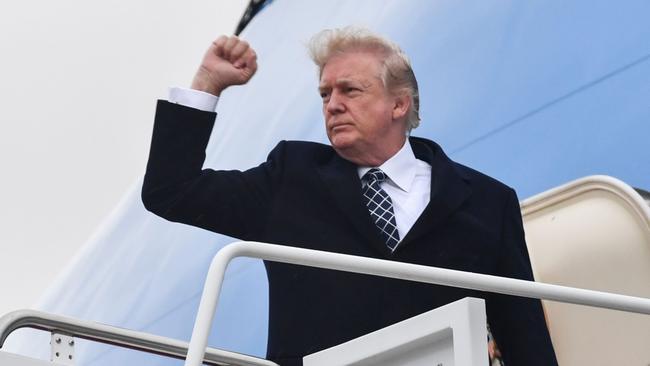Despite the tweetstorms, Donald Trump an effect economic leader
Donald Trump’s tweetstorms and politically incorrect language overshadow his considerable economic achievements.

The Donald J Trump enigma: No American President in recent US history has so dramatically improved the American economy boosting pay rates, job numbers, retail sales, business investment, profits and, of course, the share market. It’s an astounding transformation that will create a tidal wave of repercussions around the world.
Conversely no President in recent US history has been more politically incorrect and insensitive in his use of language. And in most media outlets this aspect of his administration completely overshadows the economic achievements.
Its ironic that Trump’s predecessor was exactly the reverse — he was one of the most politically correct presidents in US history hardly putting a word out of place but vast areas of the US suffered from his economic policies.
In terms of the US boom I want to start with the powerhouse that traditionally drives the American nation — its consumers. They have suddenly realised their living standards are going to rise so holiday sales during November and December increased 5.5 per cent over the same period in 2016 to $US692 billion.
These National Retail Federation number excludes restaurants, automobile dealers and gasoline stations, but includes $US138bn in online and other non-store sales, which were up 11.5 per cent over the year before.
The retail bonanza exceeded the NRF’s forecast rise of between 3.6 and 4 per cent. Consumers can see that tax cuts and pay increases are heading their way, although the consumer tax cuts will not benefit everyone.
The biggest US retailer Wal-Mart feels the boom and has made what in Australia would be an astounding decision — it has increased its pay rates by $700m, stating that it was sharing its corporate taxation cut with its employees. In fact it was beaten by Target, which made similar wage increases but more dramatically promised to increase its hourly rate from the current higher rate of $US11 per hour to $US15 by 2020. Such a move by the two retailers will spread through the nation. Wall Street has not yet woken up to the fact that not all the corporate tax cuts will go to shareholders and a slice is going to be shared with staff.
The wage-negotiating table is being dramatically changed because significant US labour shortages loom. Unemployment is down to 4.1 per cent and jobs are being created at an unsustainable rate, particularly given the cuts to migration. This will force US companies to adopt the new labour saving technologies and lead the world in this development. The Trump tax package aims to incentivise US companies to be more efficient.
The enormous investment flow that will result from the ability to write off new plants and lower tax rates on intellectual property revenue has barely begun.
However Fiat Chrysler is moving its heavy-duty truck manufacturer from Mexico to Michigan as well as paying Wal-Mart/ Target style bonuses from the corporate tax cuts. Toyota and Mazda are setting up a $US 1.6bn joint assembly line in Alabama.
By the end of 2018 we will see considerably higher US interest rates to hold the economy in check. Just how big these rises become will partly depend on the extent that pay rises boost prices and to what extent labour costs are offset by technology, higher productivity and tax cuts.
So how do we explain the enigma? The best explanation I have found comes from a leading anti-Trump writer, David Brooks, in The New York Times. Let me quote some extracts:
“It’s almost as if there are two White Houses. There’s the Potemkin White House, which we tend to focus on: Trump berserk in front of the TV, the lawyers working the Russian investigation and the press operation. Then there is the Invisible White House that you never hear about, which is getting more effective at managing around the distracted boss.
I sometimes wonder if the Invisible White House has learned to use the Potemkin White House as a feint move while it changes the country”.
And also: “People who go into the White House to have a meeting with President Donald Trump usually leave pleasantly surprised. They find that Trump is not the raving madman they expected from his tweet storms or the media coverage. They generally say that he is affable, if repetitive. He runs a normal, good meeting and seems well informed enough to get by …
The White House is getting more professional. Imagine if Trump didn’t tweet. The craziness of the past weeks would be out of the way, and we’d see a White House that is briskly pursuing its goals: the shift in our Pakistan policy, the shift in our offshore drilling policy, the fruition of our Islamic State policy, the nomination for judgeships and the formation of policies on infrastructure, DACA, North Korea and trade”.
Fascinatingly Brooks does not include the US economy in his list of White House US achievements.
Back to Australia, and give me a few politically incorrect leaders who deliver. We have too many leaders who are in the mould of the previous US president.




To join the conversation, please log in. Don't have an account? Register
Join the conversation, you are commenting as Logout